 |
|
| plants text index | photo index |
| mangroves > Lumnitzera in general |
| Teruntum
putih Lumnitzera racemosa Family Combretaceae updated Jan 2013 Where seen? This pretty plant with plasticky leaves and tiny white flowers is sometimes seen in our mangroves. It is found in the back mangroves, preferring sandy or hard mud areas. Also on shores and waterways with freshwater influence. It can tolerate more saline conditions than Teruntum merah (Lumnitzera littorea). There are some large old trees at Kranji Nature Trail. Features: Shrubs or tree up to 8m tall. Bark reddish-brown and fissured. Has no pneumatophores. Leaves spoon-shaped (2-10cm), scalloped edge and a small notch at the tip, thick and fleshy, arranged alternately in a spiral. Flowers small (1-2cm) in bunches, white with five tiny petals. The flowers are weakly scented and produce lots of nectar. According to Tomlinson, this species appear to be pollinated by day-active wasps, bees, butterflies and months. The small fruits are ribbed, fibrous and float, and dispersed by water. Each fruit contains one seed. Sometimes mistaken for Chengam (Scyphiphora hydrophyllacea). According to Giesen, although occurring throughout Malaysia and Indonesia, L. littorea and L. racemosa practically exclude each other in habitat and have never been collected in exactly the same stand. The exact cause of this different ecological behaviour is not yet known. Human uses: According to Burkill, the timber has similar properties as that of Teruntum merah (Lumnitzera littorea) but because it is a smaller plant it is less useful. Status and threats: It is listed as 'Endangered' on the Red List of threatened plants of Singapore. |
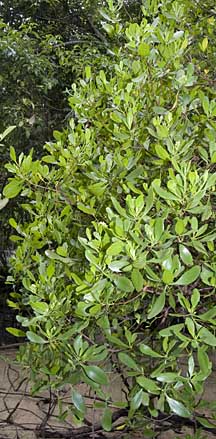 Mandai, Mar 11 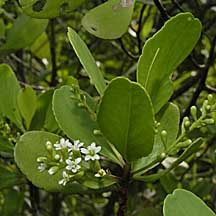 Pulau Ubin, Aug 03 |
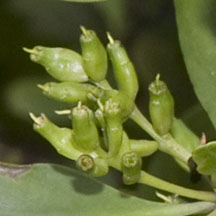 PulauSemakau, Dec 08 |
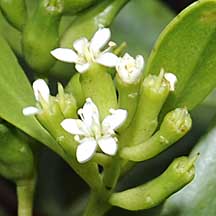 Pulau Semakau, Dec 08 |
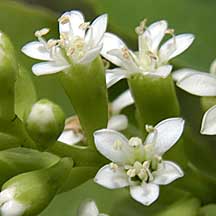 White flowers, stamens same length as petals. Pulau Ubin, Aug 03 |
| Teruntum putih on Singapore shores |
| Photos of Teruntum putih for free download from wildsingapore flickr |
| Distribution in Singapore on this wildsingapore flickr map |
|
Links
References
|
|
|